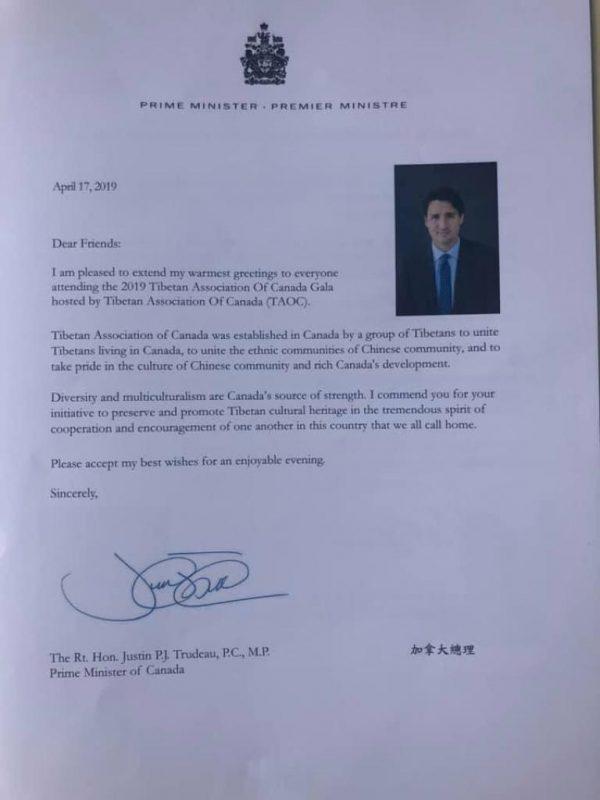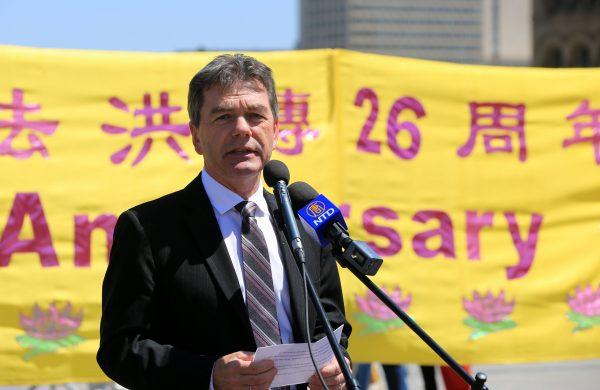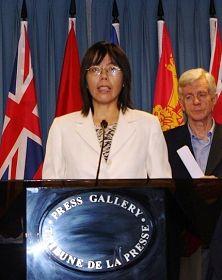A fake congratulatory letter supposedly from Prime Minister Justin Trudeau that was recently circulated on social media most likely originated from the Chinese regime’s agency responsible for coordinating influence operations overseas, says a China observer.
While the letter impersonating the prime minister seems to have been a first, fake letters and emails to government officials masterminded by Chinese Communist Party agents impersonating practitioners of Falun Gong have been a recurring—and worrisome—issue for that community for over a decade.
The fake letter in the name of Trudeau was circulated to coincide with the inauguration of the Tibetan Association of Canada—a newly formed organization that promotes Tibet’s reunification with China—held in Toronto on April 20.
On April 24, the Prime Minister’s Office confirmed to The Epoch Times that the letter was not sent by Trudeau and that the PMO was looking into the matter.
Journalist and author Jonathan Manthorpe said he has no doubt that the letter originated from the United Front Work Department, an organ of the Chinese Communist Party (CCP) that operates a worldwide program to promote Beijing’s agenda and subvert other countries by manipulating the open nature of free societies.
“This is clearly a United Front operation,” Manthorpe said at an April 27 event in Toronto related to the topic of his latest book, “Claws of The Panda: Beijing’s Campaign of Influence and Intimidation in Canada.”
“These things are going around all the time. We in mainstream Canadian society should be doing far more to protect and work against these efforts than we are doing.”
Prominent human rights lawyer and China expert David Matas said the sending of fake emails “is standard Chinese Communist Party operation procedure.”
“The Communist Party has a number of propagandistic devices, mechanisms, and institutions to bamboozle and confuse people; the Confucius Institutes are a good example of that, the fake email is another. The Communist Party is kind of, I would say, engaged in dissimulation, pretence, dishonesty, misrepresentation—they will do anything to get their point of view across,” he said in an interview.

Canadian Officials Spammed by Fake Emails Discrediting Falun Gong
Freedom House reported last year that suspected agents of the Chinese regime have in recent years used email impersonation as a tactic to mislead politicians, damage the reputation of its critics, and obtain sensitive information.Grace Wollensak of the Falun Dafa Association of Canada said fake emails are a part of the CCP’s overseas campaign against Falun Gong, a meditation practice also called Falun Dafa that has been brutally suppressed in China since 1999.
“Government officials at all levels in numerous countries have been systematically and repeatedly targeted by fraudulent emails from persons claiming to be Falun Gong practitioners,” she said.
“The emails often portray the sender as obsessive, irrational, and rude, thus lending legitimacy to the Chinese regime’s claims that Falun Gong is a menace to society and swaying would-be support from Western government officials.”
“Some of the emails have been traced to IP addresses originating in China,” she added.
In March of this year, Sue Zhang, a coordinator for Vancouver’s Falun Gong community, was forwarded an email received by NDP MP Peter Julian’s riding office. The email was sent to Julian from someone named “Cathy” who began by thanking him, then said odd things about Falun Gong and referred to an image the sender had attached of Julian superimposed on an inappropriate background.
“I have made a poster using your photograph to show how your support the fine arts and Falun Gong. I am sure that you would be glad to see the posters around the world,” the email read.
“What was said in the email claiming to be Falun Gong’s view is totally false,” Zhang said. “No Falun Gong practitioner would make that kind of poster, either. The email is deceiving and a malicious attempt to make us look obsessive and unstable.”
Liberal MP Judy Sgro, co-chair of Canadian Parliamentary Friends of Falun Gong, received a similar email to Julian’s in 2018, also with an image of her superimposed on an inappropriate backdrop and stating that it would be posted everywhere to show that she supports Falun Gong.
“It’s really an attempt to disparage the Falun Gong’s followers,” said Sgro, according to the National Post.
According to Wollensak, rounds of fraudulent emails are sent each year to MPs and cabinet ministers, including Global Affairs Minister Chrystia Freeland, around the annual Falun Dafa celebrations in May and during the Shen Yun touring season from January to May. Shen Yun is a traditional Chinese culture performance presented by the Falun Dafa Association.
“The emails appear to be inviting MPs to attend events, but then turn into bizarre threats,” she said, adding that “large numbers” of MPs began receiving such emails in 2010 in an apparent effort to discredit Falun Gong adherents.

Last year, Amnesty International sent a report to Global Affairs documenting emails purportedly from Falun Gong practitioners. The emails made grandiose and fanatical claims and were sent to MPs in an effort to reduce support for the group.
“Amnesty International reviewed seven messages that had been sent between May 12, 2015, and January 2017. Certain emails contain strange and sometimes threatening messages,” the report said.
“For example, emails from May 12, 2015, and May 14, 2015, insult then-MPs Jason Kenney and Stephen Woodworth for not attending a Falun Gong celebration and state that a forthcoming event was the last chance for him to be “saved.”
Amnesty said an April 2016 bogus email that was sent to MP David Anderson was forwarded by his office to the RCMP for investigation.
“The email chain provided to Amnesty International indicates that this message was apparently taken seriously, as the Honourable David Anderson’s Executive Assistant forwarded this email to the RCMP,” the report said.

Over a Dozen Versions
In 2015, Bruce Hyer, then-deputy leader of the Green Party of Canada and an MP, received an email calling him “stupid” to “have missed the last chance to be saved” by not attending a Falun Gong event. “Waiting for you will be a THOROUGH ELIMINATION!” the email said.That year, more than 10 Canadian MPs confirmed receiving fraudulent emails impersonating Falun Gong adherents saying nasty things and threatening things, according to Wollensak.
“Over the years, the Falun Dafa Association has received more than a dozen different versions of fake emails forwarded from Canadian elected officials. We thank those officials for keeping us informed and hope others are not being deceived or manipulated by such emails,” she said.
“Most importantly we hope our government can take effective measures to curb such a reprehensible practice in Canada. If foreign government agents are so bold as to fake a letter from the prime minister, how much further could it go?”

Former NDP MP Wayne Marston received a bogus email purportedly from a Falun Gong practitioner in 2011. Marston’s office tracked the IP address and found that it originated in Hebei Province, China. The email was sent 2 a.m. EST, which is daytime in China.
Both Matas and former MP and Secretary of State David Kilgour—authors of “Bloody Harvest: The Killing of Falun Gong for Their Organs”—said they’ve also received emails from someone impersonating Falun Gong practitioners in the past.
In one email, Matas was told that if he did not practice Falun Gong, he and his family would suffer dire consequences, and if he didn’t reply to the email he would “face difficulties and big suffering.”
“Obviously it is an attempt to discredit Falun Gong. For me, I am not going to be convinced by some Communist Party pretence, but some people are. It can be quite damaging for the promotion of respect for human rights,” he said.
“The point of this all is to give the impression that the government of Canada thinks that what’s happening in China to Falun Gong is perfectly okay, and of course in the case of Tibet, what’s happening to Tibet is perfectly okay, which is not the reality,” he added.
“So I think it is important to counter this dissimulation and pretence so that people don’t lose track of the real violations that are happening.”

Bogus Emails Sent to Officials in Other Countries
Government officials in other countries have been targeted by fake email campaigns as well.John Hugh, a former city councillor in Parramatta, Australia, received a suspicious email from someone named Amanda Chin who claimed to be a Falun Gong practitioner and asking him to attend an event. When he replied that he was unable to attend, Amanda wrote back, “STUPID! This was the last chance for you to be saved. Waiting for you will be a THOROUGH ELIMINATION!”
An email sent to a U.S. senator’s office in January 2011 was traced to an IP address in Hubei province, China.
The sender, who claimed to be a Falun Gong spokesperson, thanked the senator for his past support and then made a series of unusual demands, including that the senator and his family practice Falun Gong. It ended with a threat that if the demands were not met, Falun Gong adherents would be mobilized to ensure the senator did not win re-election.
After the Christchurch earthquake in 2011, elected representatives in New Zealand received emails from someone impersonating a Falun Gong practitioner stating that the 159 people who died “got what they deserved.” Dr. Cathy Casey, an Auckland councillor who recognized the email she received as a hoax, said it was “shocking” and “reprehensible” that someone would resort to such tactics.
“As the Communist Party finds that people in the West can see through their direct propaganda and vilification of Falun Gong, it resorts to this kind of underhanded tactic to make practitioners appear irrational, push would-be supporters away, and indirectly justify the torture and killing of innocent people in China,” said Erping Zhang, spokesperson for the Falun Dafa Information Center.
“These fraudulent e-mails are part of a much broader campaign of misinformation, cyber attacks, and online espionage carried out by Chinese agents against Falun Gong practitioners outside China. We encourage those who might come in contact with future messages such as this to be on their guard and immediately alert the Falun Dafa Information Center to check the authenticity of the information,” said Zhang.





